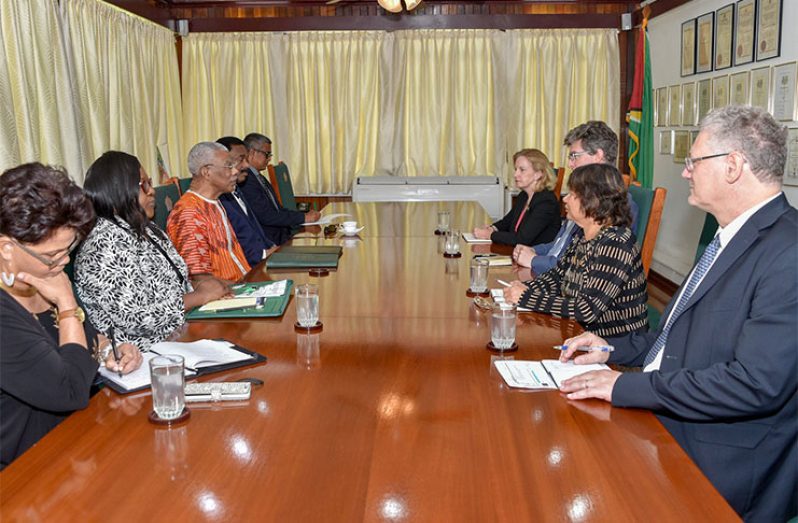President David Granger on Wednesday met with top Western diplomats here during which they discussed the current political situation with the ambassadors commending the Guyanese leader on his appointment of a new chairperson for the Guyana Elections Commission.
At the meeting were United States Ambassador to Guyana, Ms. Sarah-Ann Lynch; British High Commissioner to Guyana, Mr. Greg Quinn; Canadian High Commissioner to Guyana, Ms. Lilian Chatterjee and European Union’s Ambassador to Guyana Mr. Jernej Videti?.
President Granger explained that at all times he has complied with the rulings of the Courts and most particularly, the ruling of the Caribbean Court of Justice (CCJ). The Head of State was accompanied by Attorney General and Minister of Legal Affairs, Basil Williams, SC; Minister of Foreign Affairs, Dr. Karen Cummungs; and Director General, Ministry of Foreign Affairs, Ambassador Audrey Waddell.
Last week the United States, United Kingdom and Canada all hailed the appointment of Justice (rtd) Claudette Singh as the new chairman of the Guyana Elections Commission, ending months of stalemate between the key political leaders. In a terse message on its Facebook page, the US Embassy said, “We commend Guyana’s leadership for agreement on an Elections Commission Chairperson, in compliance with the Caribbean Court of Justice ruling. We encourage continued collaboration toward free and fair elections.” UK High Commissioner to Guyana, Greg Quinn, in a statement said, “I welcome this extremely positive development. I look forward to meeting the new GECOM chair.
All relevant actors are to be congratulated on this agreement.” For her part, Canada High Commissioner to Guyana, Lilian Chatterjee, on her Twitter account said: “Progress for the citizens of Guyana!”
Following the Caribbean Court of Justice (CCJ) rulings, the Western diplomatic community had called on all sides of the political divide to respect the ruling of the regional court. United States Ambassador to Guyana, Sarah-Ann Lynch; United Kingdom High Commissioner, Greg Quinn; Canada High Commissioner, Lilian Chattergee and Head of Delegation of the European Union to Guyana, Jernej Videtic, noted in a joint statement, that “it is important that all sides respect the ruling,” adding that “we also encourage all to come to an agreement on the way forward.”
President Granger, last Thursday, had met with members of the diplomatic community to personally explain Guyana’s current political, the legal actions taken by the government thus far and its intention to usher Guyana into fair, free and credible elections as early as possible.
At the meeting held at the Baridi Benab at State House on Thursday, President Granger committed to upholding the Constitution; respecting the National Assembly and the courts; ensuring the rule-of-law; safeguarding human and civil rights and preserving democracy. He gave a detailed review of the legal processes which began with the challenging of the passage of the no-confidence motion in the National Assembly on December 21, 2018 and ended with the ruling of Guyana’s highest appellate court, the Caribbean Court of Justice (CCJ).
He also spoke to the issue of dual citizenship which also spurred out of the no-confidence motion. With documents to validate the information provided to the representatives, the President stated that at each interval, the government has acted in good faith and has complied with the rulings of the three courts involved. Such intervals highlighted were: meeting the Leader of the Opposition in January 2019; meeting the Elections Commission in March 2019; accepting the resignation of four Cabinet ministers on April 25, 2019 who were dual citizens.
Regarding the latter, President Granger said, “It was very painful, but we obeyed the court.” He also highlighted that he has since made three broadcasts to the nation on the government’s acceptance of the CCJ’s ruling and Consequential Orders and has accepted the resignation of the former GECOM Chairman, Justice(ret’d) James Patterson.
He stated that free, fair and credible elections are essential to a democracy but can only be achieved if there is an independent and functional Elections Commission; an acceptable and credible Official List of Electors (OLE) and an efficient and competent secretariat to manage these elections. “The credibility of elections is dependent in part on the integrity of the Official List of Electors. A corrupted or contaminated list can undermine the electoral process, encourage mischief and malpractice and result in elections being vitiated,” he stated.
On the issue of the selection of a GECOM chair, he reminded the diplomats that the CCJ had interpreted the provisions of the Constitution as ascribing a role for the President in identifying persons for consideration as Chair. “The President is not a passive bystander in the process,” he affirmed. “He is an active participant in ‘hammering out’ the list of persons not unacceptable to him.”
Added to this, President Granger reminded that the CCJ did not issue a date, deadlines or timelines of the holding of new elections. He stated: “It is for the Elections Commission to advise the President on its readiness to conduct free, fair and credible elections. It would be reckless and irresponsible, on my part, to name a date for elections without the commission’s assurance and advice that it would be ready to conduct elections on such a date.”





.jpg)








